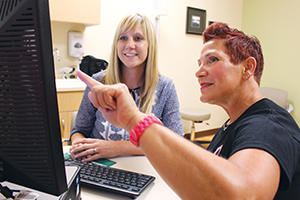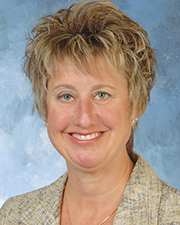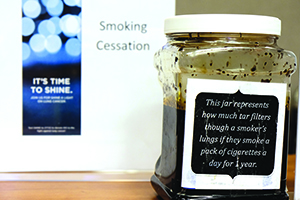By RENEE STOVSKY
When Avera McKennan Hospital and University Health Center in Sioux Falls, S.D., opened the doors to its new cancer institute in 2010, the facility came inaugurated with a shiny stamp of recognition — the CEO Cancer Gold Standard.

Karee Stearns, right, a breast cancer survivor, group fitness supervisor and cancer exercise specialist at the Avera McKennan Fitness Center, reviews test results with Nancy Terveen, a nurse practitioner and breast cancer navigator at the Avera Cancer Institute in Sioux Falls, S.D.
"Fred Slunecka, our CEO at the time, wanted to send a message to the staff that we intended to take care of our employees as well as our community," says Kris Gaster, assistant vice president of outpatient cancer clinics there.
To receive that recognition, Gaster says Avera McKennan officials met first with the American Cancer Society to make sure internal policies and programs were in place to reduce employees' cancer risks, provide for early detection of disease and offer access to clinical trials. Then they collaborated with their human resources department to offer everything from fitness and smoking cessation programs to nutrition counseling and access to regular screenings for health center personnel.
After that, they applied for the Gold Standard certification for their workplace-based wellness initiative from the CEO Roundtable on Cancer, a nonprofit organization dedicated to addressing cancer in a variety of ways.
Taking action
According to the Roundtable, more than 4.5 million people from 175 organizations — from law firms and advertising agencies to health care centers — are now covered by the certification. It's a powerful way, says the group, to try to lower the incidence of cancer. U.S. statistics show that men have an almost 1 in 2 risk of developing cancer in their lifetime, while women face an approximate 1 in 3 risk.
"The Gold Standard defines what business leaders can do about cancer. CEOs can set the tone for action … helping (employees) quit tobacco if they smoke, encouraging them to eat a healthy diet and be physically active, reminding them to be screened at the appropriate time for certain cancers and offering the assurance of high-quality cancer treatment should they need it," says the advocacy group.
Gold Standard certification is based on five "pillars" an organization is expected to implement in the fight against cancer. The pillars involve education, prevention and access to high-quality treatment. (See sidebar.)
Stepping up the pace

Guthrie
Like many health care facilities, says Gaster, Avera McKennan met most of the Gold Standard's requirements even before certification. Even so, she says, going through the process — and maintaining the recognition — has been beneficial.
"The Gold Standard has facilitated dialogue and helped us become more robust in our cancer prevention and care programs," she says. "For example, we now have group physical activity and weight loss challenges. We've implemented an annual 'To Your Health' program with lifestyle surveys and height, weight and fasting blood sugar screenings. And we offer stress screenings for cancer survivors and support groups like 'Time To Heal,' a 12-week program that addresses psychosocial, nutritional, financial and spiritual issues."
Though results of Gold Standard initiatives are hard to quantify, Gaster does point to one statistic the cancer institute takes pride in: At 12 percent of its population, Sioux Falls far exceeds the national rate of 4 percent of people participating in clinical cancer trials.
Clearing the smoke
Sandy Miller, network director of oncology services at Seton Healthcare Family in Austin, Texas, also says she has seen an uptick in cancer prevention awareness and participation in healthy lifestyle and screening programs since her organization, which represents 12,700 employees, gained its Gold Standard certification in 2013.

A jar of tar on display at an open house at the Seton Cancer Survivor Center in Austin, Texas. Seton employees and patients attended the event, which was held earlier this year.
"Now we have even updated our smoke-free policy to include a ban on e-cigarettes on the premises," she says.
"With all the programs we provide, from one-on-one nutritional coaching to physical challenges and mobile screenings, our associates seem to have a greater sense of awareness and personal responsibility about their health," she adds.
She points to the fact that more than 100 associates chose to participate in a recent Seton-sponsored, American Cancer Society event on early assessment of risk factors for cancers, while a lung cancer awareness program last November drew 70 people to watch demonstrations of diagnostics, treatment and survivor services.
"The Gold Standard initiative has helped make this feel like a community effort — like we are doing the right thing for each other," says Miller.
From talk to action
Katherine Guthrie, regional director of cancer services for Dignity Health's Central Coast Service Area in California, concurs with that sentiment. Two of the hospitals she oversees — Marian Regional Medical Center of Santa Maria, Calif., and Arroyo Grande Community Hospital of Arroyo Grande, Calif. — adopted the Gold Standard certification in 2011, covering approximately 1,200 workers. "The program has given us much more than accreditation — it's given us a way to bring our employee family together to think about wellness in the workplace," she says.
In the past four years, Guthrie says, the hospital has focused more effort on educational initiatives for employees, including lunch-hour programs on nutrition, smoking cessation and cancer screenings led by physicians, oncology dietitians and nurse navigators. Twice-monthly email newsletters center on key topics in cancer prevention, and annual reports in 2013 and 2014 focused on colorectal cancer and lung cancer. This year's report will cover prostate cancer.
Statistics show a positive response from all the public conversations: Employee participation in mammograms has increased 23 percent, while colonoscopy screenings have risen 12 percent in the Dignity Central Coast Service Area.
"It's an unfortunate but well-known fact that caregivers often do not take care of themselves," says Guthrie. "The CEO Cancer Gold Standard program has allowed us to show people we work with side by side that healthy lifestyles and early detection and treatment of disease are important not only for the community we serve, but for our health care community too."
| Five pillars of CEO Gold Standard workplaces Before it certifies companies as CEO Gold Standard workplaces, the CEO Roundtable on Cancer establishes that applicants are working to reduce their employees' cancer risks through: Prevention — This includes maintaining a tobacco-free workplace and giving employees access to proven smoking cessation treatments, providing nutrition counseling to promote healthy diets, stressing the importance of physical activity, focusing on weight management and avoiding obesity and encouraging appropriate vaccinations. Screenings — Companies provide access and coverage to screenings for breast cancer, cervical cancer and colorectal cancer — as well as other exams that are age and gender appropriate — to detect disease at the earliest possible stage, when management and/or treatment has the best chance for a positive outcome. Cancer clinical trials — Gold Standard-certified companies ensure employees can access clinical trials that may yield new, more effective cancer treatments that can benefit not only current employees, but also future generations of employees as well. Quality treatment and survivorship — Participating companies ensure that employees can have access to quality treatment and to educational resources about survivorship for patients as well as for caregivers who need to respond to their varied needs. Health education and health promotion — Employers inform employees about cancer prevention and care and encourage appropriate health behaviors and participation in healthy workplace initiatives. |
Copyright © 2015 by the Catholic Health Association
of the United States
For reprint permission, contact Betty Crosby or call (314) 253-3477.